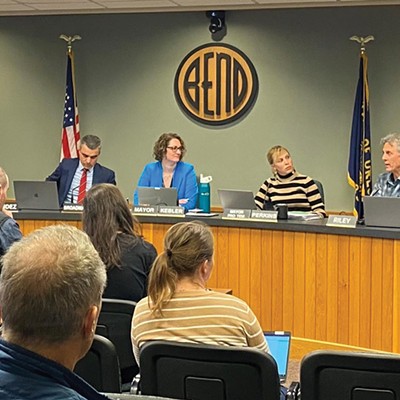Plenty of people think of Oregon as a rainy, green oasis – but those of us who live in the 2/3 of the state that doesn't look like that know differently. Here in Central Oregon, water is scarce enough to mean some farmers don't get the water they need at crop-growing time. Others begin hobby farms to keep the irrigation water rights they do have, holding onto those rights for the proverbial rainy day. Business and environmental interests battle over the number of cubic feet per second that are adequate for fish and aquatic life in rivers, including the Deschutes. Cities including Bend take steps to curb residential water usage – even, ironically, while they have limited knowledge of how much private entities are using within city bounds.
But even as the impacts of a historically significant drought continue to affect people's way of life, it turns out we still have lots to learn. A new advisory report from the Oregon Secretary of State aims to change that. The title of the report is descriptive: "State Leadership Must Take Action to Protect Water Security for all Oregonians." In it, state auditors contend that communities across the state are dealing with water insecurity – a term coined to describe the inability to "reliably and routinely access adequate, safe, and clean water to meet their needs," as described in a press release from Secretary of State Shemia Fagan.
The report details how factors including climate change, drought, overallocation of surface and groundwater and the presence of contaminants degrading water quality are endangering public health.
"Water is life. And the findings in this advisory report are shocking," Fagan stated in the press release. "Not only are many families in Oregon dealing with water insecurity today, many more are at high-risk of becoming water insecure in the very near future.What's shocking about this report is it shows that we don't have a plan to address the problem. What interventions have happened have been scattershot and seemingly aimed at addressing urgent needs rather than planning comprehensively."
The report detailed a number of areas of concern, including:
- The state lacks broad, diverse, and appropriately representative community engagement in water decisions
- Oregon does not have an actionable statewide water plan, or a regional framework that could tie a statewide plan to regional planning and implementation
- Key water agencies and state leadership lack shared water security priorities, making coordination more difficult when agencies have distinct areas of focus
- Water data is disaggregated and not set up to support regional planning needs
- The state lacks a water funding strategy that ties planning to investments, sustained funding for meeting community planning and implementation needs, and state agencies lack funding and capacity to fully carry out their duties
- External pressures, such as litigation from stakeholders, can sometimes prevent agencies from using their regulatory discretion to public benefit
- Federally recognized Tribes are unable to ensure water security in their homelands due in part to certain ongoing agricultural and industrial practices
As the second-to-last bullet point identifies, efforts to regulate or even monitor water use can be met with litigation that costs governments – and even businesses like ours – money. In our newsroom, a basic request for water usage data from Avion Water resulted in the paper being the target of a lawsuit. Water is life, indeed – and in the drying climate, that truism results in a closing of ranks.
The report's recommendations are important and should be pursued. In addition, cities like ours should be empowered and funded to better monitor and manage their waters. Among the recent goals set forth by the Bend City Council, councilors included the goal to, "Incentivize conservation to reduce water use for the community." To this point, companies like Avion, which are contracted by the city to administer residential water, should not be able to withhold information about usage.
The recent report from the Secretary of State's office is an enlightening read and one that seeks to address the issues facing one of humanity's most basic needs. It should not be ignored.






















